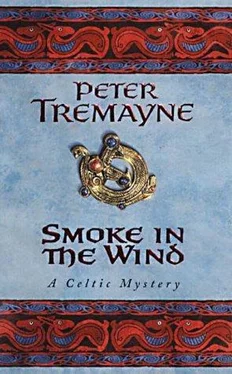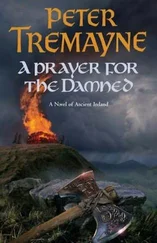Peter Tremayne - Smoke in the Wind
Здесь есть возможность читать онлайн «Peter Tremayne - Smoke in the Wind» весь текст электронной книги совершенно бесплатно (целиком полную версию без сокращений). В некоторых случаях можно слушать аудио, скачать через торрент в формате fb2 и присутствует краткое содержание. Жанр: Исторический детектив, на английском языке. Описание произведения, (предисловие) а так же отзывы посетителей доступны на портале библиотеки ЛибКат.
- Название:Smoke in the Wind
- Автор:
- Жанр:
- Год:неизвестен
- ISBN:нет данных
- Рейтинг книги:5 / 5. Голосов: 1
-
Избранное:Добавить в избранное
- Отзывы:
-
Ваша оценка:
- 100
- 1
- 2
- 3
- 4
- 5
Smoke in the Wind: краткое содержание, описание и аннотация
Предлагаем к чтению аннотацию, описание, краткое содержание или предисловие (зависит от того, что написал сам автор книги «Smoke in the Wind»). Если вы не нашли необходимую информацию о книге — напишите в комментариях, мы постараемся отыскать её.
Smoke in the Wind — читать онлайн бесплатно полную книгу (весь текст) целиком
Ниже представлен текст книги, разбитый по страницам. Система сохранения места последней прочитанной страницы, позволяет с удобством читать онлайн бесплатно книгу «Smoke in the Wind», без необходимости каждый раз заново искать на чём Вы остановились. Поставьте закладку, и сможете в любой момент перейти на страницу, на которой закончили чтение.
Интервал:
Закладка:
‘ Varium et mutabile semper femina , eh, Clydog? You should watch out for this one. I told you that this was unwise.’
‘Wait!’ Clydog came to his feet. His face mirrored his annoyance. ‘I will send food and drink to your Saxon friend if it means so much to you.’
Fidelma stood, unmoving, in Corryn’s vice-like grip. There was nothing else she could do.
Clydog turned to Corryn with an angry gesture. ‘Release her and see that food and drink are taken to the Saxon.’
The man did not immediately let go of her arm. ‘What use is feeding a man who will die anyway?’
‘Do it now,’ snapped the outlaw leader, ‘or we will have a falling out.’
Corryn suddenly pushed her away and she spun round to face him. She saw the blaze of anger and resentment in the man’s vivid blue eyes. Then he controlled his features. He shrugged and turned to his companions at the fire, barking out orders. One of them reluctantly arose and cut off some portions of the roasting venison, and put them on a wooden platter. Then he took a beaker of mead and went to the hut.
Satisfied, Fidelma returned her gaze to Clydog, who had reseated himself but was watching Corryn with a strange expression on his pale face.
‘So you mean to kill us?’ Fidelma demanded quietly, standing before him.
‘I am no friend to Saxons,’ he replied shortly.
‘Nor to anyone else, so it seems.’ She glanced again to where Corryn was seated at the fire.
Clydog shook his head slowly. ‘You are a determined lady, aren’t you? Anyway, I am not responsible for the views of my men. It is I who give the orders here and so far I have not ordered anyone to be killed. So come and sit down again.’
Fidelma did not bother to respond.
‘Sit down, Gwyddel!’ The order was issued in a sharper tone. ‘Be grateful that I saved you from Corryn. He would have killed you both at Llanpadern. I was only able to spare the Saxon’s life because he was a healer.’
Fidelma sat down stiffly, her face expressionless. She was trying to work out Clydog’s implication that he was somehow accountable to Corryn for his actions. Her captor chuckled in appreciation.
‘I can see that you will be an excellent guest,’ he mocked.
‘What do you want of me, Clydog?’ she demanded. ‘Why do you wish to hold Brother Eadulf and myself as prisoners?’
‘Should I want anything more than your company at this meal? Come, eat your fill and enjoy the conversation. You will find that I am an educated person who is sometimes starved for intellectual discourse.’
‘You can surely speak to your companion there,’ she sneered, nodding towards Corryn. ‘One who can quote Virgil must be educated.’
Clydog frowned. Her comment seemed to worry him.
‘Anyone can pick up Latin here and there,’ he said, almost defensively. ‘Now, relax and let us enjoy the meal.’
‘I would rather be starving in the forest,’ she replied spiritedly. ‘At least the wild animals would be better company.’
‘Can it be that you dislike me so much?’ mused the young man, still smiling. ‘Dislike is but a dismal reflection of your own desire.’
Fidelma could not suppress the smile which shaped her lips. ‘I do not know you well enough to hate you, Clydog,’ she informed him with amusement. ‘But I certainly dislike you and that does have something to do with desire.’ His eyes widened but she went on: ‘My desire is that you should be a thousand miles from this place.’
Clydog took a sharp knife from his belt, manipulating it ostentatiously before rising from his seat, moving to the spit and cutting slices of the roasting venison, which he placed on two wooden platters. He turned and handed one of them to her and then reseated himself.
‘I am sure that someone with your intelligence, lady, has read Antisthenes,’ he said, after a moment.
‘You surprise me that common thieves such as yourselves have read the eminent philosophers. First we hear from Virgil and now of Antisthenes.’
Clydog did not respond to her jibe. ‘If, lady, you claim you dislike me, then perhaps you should recall those words of Antisthenes. Pay attention to those you dislike, to your enemies, for they are the first to discover your faults and mistakes.’
Fidelma bowed her head slightly. ‘Publilius Syrus is my favourite philosopher. Perhaps you have read him?’
‘I have some knowledge of his moral maxims.’
‘He said that there was no safety in gaining the favour of an enemy. You may call the enemy your friend only when he is dead.’
‘Publilius Syrus,’ sneered Clydog. ‘Who was he but a slave from Antioch who was brought to Rome and managed to win his freedom by writing plays which pandered to the sensibilities of his masters?’
‘Do you disapprove of his maxims, of his plays, that he was from Antioch, or because he was a Roman slave who won his freedom? Many of your ancestors followed that same path.’
‘Not my ancestors!’ Clydog snapped with an anger which surprised Fidelma.
‘I mean those Britons and Gauls who were taken as slaves to Rome and won their freedom.’
‘Let them speak for themselves. I will speak for myself.’
‘You are obviously an intelligent man, Clydog. Who are you?’ Fidelma suddenly asked. ‘You are too intelligent to be a mere outlaw.’
The young man glanced at her. The shadows caused by the flickering fire disguised the expression on his face.
‘I have told you who I am.’
‘Clydog the Wasp, an outlaw,’ Fidelma acknowledged. ‘Yet what made you so? You were not born a thief.’
The young man laughed brusquely. ‘I am what I am because I want more in life than it has been my fortune to have been given. But it is not to talk about me that I asked for your company at this feasting.’
There was the sound of raised raucous voices from the other side of the fire. Fidelma was amazed to see that Corryn had been persuaded to take up a stringed instrument which reminded her of a ceis , a small, square-shaped harp whose strings were set diagonally, much played in her own land. The voices died away as Corryn struck up a song. His voice was a tenor, melodious and sweet.
‘Winter’s day, thin are the stags,
swift and sturdy is the black raven,
the wind is as swift as a storm cloud,
woe to him who trusts a stranger,
woe to the weak, woe to the weak.’
Fidelma sniffed deprecatingly. ‘Is that your philosophy, Clydog? Woe to the weak?’
‘What better philosophy?’ agreed the outlaw. ‘It is the strong who shall inherit this earth.’
‘Then you are not a Christian? Our Lord said that those who are blessed with a gentle spirit shall have the earth for their possession. You do not share that sentiment?’
‘I am not a Christian. I do not share the teachings that deny men courage and strength. Your God is a god of slaves and encourages them to remain slaves. He encourages people to remain poor, to be hungry, to be without clothes. Your God is a god invented by the rich to enslave the poor. Away with such nonsense! Away with such teachings of slavery!’
Fidelma examined the young man with interest. His voice was edged with passion.
‘Were you poor and enslaved, Clydog?’
He turned angrily on her. ‘What do you-’ He caught himself. ‘I did not say. .’
Fidelma smiled gently. ‘I see there is an anger in your heart and you are prepared to forgive nothing. Luke wrote: “Where little has been forgiven, little love is shown.” ’
‘Don’t preach your faith to me, Gwyddel. We do not need it. Anyway, you should approve of sinners like me, being a Christian.’
Fidelma was puzzled and said so.
‘Do not your teachings tell us that the greater the sinner, the better saint he makes? The more he has sinned, the more your Christ will forgive him?’
Читать дальшеИнтервал:
Закладка:
Похожие книги на «Smoke in the Wind»
Представляем Вашему вниманию похожие книги на «Smoke in the Wind» списком для выбора. Мы отобрали схожую по названию и смыслу литературу в надежде предоставить читателям больше вариантов отыскать новые, интересные, ещё непрочитанные произведения.
Обсуждение, отзывы о книге «Smoke in the Wind» и просто собственные мнения читателей. Оставьте ваши комментарии, напишите, что Вы думаете о произведении, его смысле или главных героях. Укажите что конкретно понравилось, а что нет, и почему Вы так считаете.












